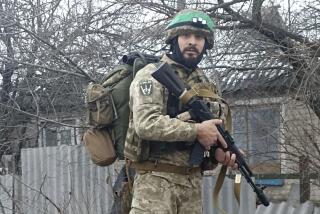2 Colombian Soldiers Sanctioned for Bombing
- Share via
BOGOTA, Colombia -- A Colombian helicopter pilot and crewman have been sanctioned for dropping a U.S.-made cluster bomb on a small Colombian town nearly four years ago, killing 18 villagers in a military operation that allegedly involved two private American companies.
Capt. Cesar Romero and crewman Hector Mario Hernandez intentionally dropped a bomb on Santo Domingo on Dec. 13, 1998, amid a heated battle near the town between guerrillas and the Colombian army, according to a report of a finding this month by the Colombian attorney general’s office obtained by The Times.
The finding, arrived at in an administrative hearing similar to an internal affairs investigation, marks the first time that anyone has been found responsible for the incident, which left seven children and 11 adults dead.
The finding, which has not been made public, is subject to appeal. Romero could not be reached for comment Wednesday. Hernandez denied involvement. “I had nothing to do with this,” he said in a brief telephone interview.
The two men were suspended for three months from active military duty, the maximum possible penalty permitted under the administrative code in effect at the time of the incident.
“They made no distinctions as to whom they were attacking,” said a lawyer in the attorney general’s office, who did not want to be identified because of security concerns. “The men violated international humanitarian law.”
Two other men accused in the case, co-pilot Johan Jimenez and Army Maj. Juan Manuel Gonzalez, who was accused of failing to stop looting in the town during the battle, were absolved of responsibility.
Human rights groups and Democrats in the U.S. Congress regard the Santo Domingo bombing as a test case for the Colombian military, which in the past has been reluctant to pursue charges against its soldiers.
On Wednesday, they welcomed news of the attorney general’s decision but assailed the Colombian military for what they regard as its continuing efforts to impede the investigation. A separate military inquiry into the bombing has stalled.
Colombian Air Force Gen. Hector Fabio Velasco has maintained that those killed in Santo Domingo were victims of a car bomb planted in the town by guerrillas. Velasco did not respond to attempts to reach him Wednesday.
Sen. Patrick J. Leahy (D-Vt.), chairman of the foreign operations subcommittee of the Appropriations Committee, threatened Wednesday to hold back a portion of U.S. aid to Colombia unless the military takes action in the case.
Congress has proposed sending $673 million in aid to Colombia in fiscal 2003, much of it to help the Colombian military combat the leftist rebels and right-wing paramilitaries warring for control of the country.
“If justice is not done, the Congress should withhold aid to the Colombian air force,” said Leahy, who has closely followed the case. “There has to be a consequence for killing 18 innocent people and lying about it.”
Human rights groups said that the Colombian government must do more to investigate the incident. They also criticized the military’s inquiry, saying the incident should be investigated by civilian authorities.
“This doesn’t reflect due process, especially for the victims and surviving family members,” said Robin Kirk, Colombia expert for New York-based Human Rights Watch. “This case should be tried in a civilian court to reveal what really happened.”
After a Times story about the incident was published in March, Northwestern University’s Center for International Human Rights filed a petition with the Inter-American Commission on Human Rights in Washington against the Colombian government, alleging that it had failed to fully investigate the bombing.
The Santo Domingo incident began when U.S. Customs planes helped the Colombian military detect a private aircraft suspected of engaging in an arms-for-drugs deal involving the Revolutionary Armed Forces of Colombia, or FARC, Colombia’s largest rebel group.
The resulting confrontation between the Colombian military and the rebels evolved into a battle that raged only 1,000 yards from Santo Domingo. With its soldiers pinned down, the Colombian army requested air support.
Romero and his crew responded by using their Huey helicopter and a crude bombing mechanism to drop a World War II-era AN-M41 cluster bomb in the middle of the town, according to the attorney general’s finding. The pilots have maintained in sworn statements that they dropped the bomb outside of town.
The earlier Times report found that military and court records show that Romero’s helicopter and other military units involved in the operation were given food, supplies and logistical support by Los Angeles-based Occidental Petroleum Corp., which operates an oil complex and pipeline 30 miles north of Santo Domingo.
The records also indicate that a second U.S. company, Florida-based AirScan Inc., participated in the bombing, helping plan the operation and providing targeting information. AirScan had previously been under contract with Occidental to help patrol the pipeline.
Occidental officials declined to comment Wednesday on the finding. In the past, they have said they were unable to confirm or deny their involvement in the incident.
AirScan officials did not return a phone call Wednesday. Previously, they have denied that their aircraft was used for anything but pipeline patrols.
The U.S. Coast Guard is investigating whether an active-duty Coast Guard pilot was flying an AirScan plane that flew alongside Romero’s helicopter during the bombing. The Coast Guard did not respond to requests for an update on the investigation Wednesday.
The attorney general’s finding made no mention of the alleged American role in the operation.
The U.S. Embassy rebuffed an attempt by the attorney general’s office to locate AirScan employees to testify as witnesses in the case, according to e-mails obtained by The Times this summer through a Freedom of Information Act request.
More to Read
Sign up for Essential California
The most important California stories and recommendations in your inbox every morning.
You may occasionally receive promotional content from the Los Angeles Times.













